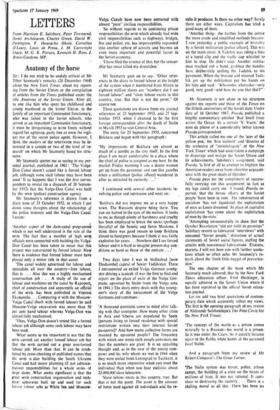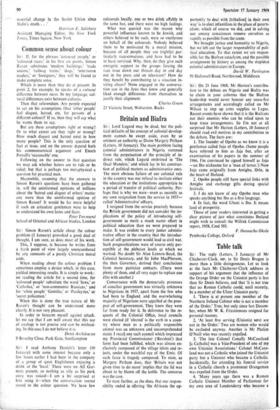Anatomy of the, horse
LETTERS
From Harrison E. Salisbury, Peter Townsend, Denis Archdeacon, Charles Green, David W. Parting Ion, F. iheanacho Okole, Cornelius O'Leary, Louis de Firma, J. M. Cartwright Sharp, M. G. K. Pierson. Kenneth H. Ross. I. Bruce-Gardyne, MP.
Sir: I do not wish to be unduly critical of Mr Tibor Szamuely's remarks (20 December 196) about the New York Times, about my report- ing from the Soviet Union or the compilation of articles from the Times published under the title Anatomy ot the Soviet- Union. After all, to one like him who spent his childhood and young manhood in the Soviet Union, in the family of an important Communist functionary, who was- raised in the Soviet schools, who served as an important Communist functionary; it must be invigorating to write freely withotit regard for agitprop, party line or even the vigil- ant eye of the secret police agent. However, I think the readers of the SPECTATOR may be in- terested in a sample or two of the kind of 're- search' on which Mr Szamuely based his stric-' tufts.
Mr Szamuely quotes me as saying in my per- sonal journal, published in 1961: The Volga- Don Canal doesn't sound like a forced labour job, although some such labour may have been used.' It so happens that I was the first corres- pondent to reveal (in a dispatch of 20 Septem- ber 1952) that the Volga-Don Canal was built by the !vivo (police) construction agency.
Mr Szamuely's reference is drawn from a diary note of 23 October 1952, in which I put down some thoughts about the relationship 4 _ the police ministry and the Volga-Don Canal. I wrote : 'Another aspect of the dam-canal program which is not well understood is the role of the MVD. The fact that a number of high ss, officials were connected with building the Volga., Don Canal has been taken to mean that this project was constructed by forced labour. Now there is evidence that forced labour must have played only a minor role in that canal.
'The canal widely advertised for labour and specialists all over the country—free labour, that is. . . Also this was a highly mechanised construction job . . . A study of the use of labour and machines on the canal by Rapoport chief of construction and apparently an official of the MVD, has been published in Voprosi Ekonomiki . Comparing it with the Moscow- Volga Canal (built with forced labour) he said Moscow-Volga excavation was more than 50 per cent hand labour whereas Volga-Don was almost fully mechanised.
'Thus, Volga-Don doesn't sound like a forced labour job although some such labour may have been used.
'What seems to me important is not that the MVD carried out another forced labour iob but that the MVD carried out a great non-forced labour job. More than that. It can be estab- lished by cross-checking of published names that the MVD is also building the South Ukraine Canal and had major planning (if not adminis- trative) responsibilities for a whole series of large dams. What seems significant is that the great mvo construction organisation and tech- nical apparatus built up and used tor such forceo labour robs as White Sea and Moscow. nit Volga Canals have now been entrusted with almost "pure" civilian responsibilities.
'So without regards to its continuing prison responsibilities the MVD which already had wide civil responsibilities such as highways, bridges, fire and police, etc, has imperceptibly expanded into another sphere of activity and become an even more important and powerful factor in the Soviet economy.
'I have filed the essence of this, but the censor- ship has twice killed my dispatches.'
Mr Szamuely goes on to say : 'Other refer- ences in the diary to forced labour at the height of the system when it numbered from fifteen to eighteen million slaves are "nowhere did I see forced labour" and "slave labour exists in this country, true. But that is not the point." Of course not; These quotations are drawn from my journal references of 25 September 1953, and 27 Sep- tember 1953. when I chanced to be the first foreign correspondent after the death of Stalin in March 1953 to visit Central Asia.
The entry for 25 September 1953, concerned Bokhara and began with this paragraph :
'My impressions of Bokhara are almost as much of a jumble as the city itself. In the first place I am never comfortable in a place where the' chief of police is assigned as my host. In the market Friday morning 1 saw a dozen women get up from the pavement and run like gazelles when a militiaman (police officer) wandered in after us attracted by curiosity ...9
I continued with several other incidents in- volving police and repression and went on: 'Bokhara did not impress me as a very happy town. The Russians despise being there. You can see hatred in the eyes of the natives. It looks to me as though plenty of harshness and cruelty has been employed to break the necks (perhaps literally) of the fanatic and fierce Moslems. I think there was good reason to keep Bokhara dosed to foreigners because I think it was fairly explosive for years. .. Nowhere did I see forced labour and it is hard to imagine present-day con- ditions as hard as those of the emirate .
Two days later I was in Statinabad [now Dushambej capital of Soviet Tadjikstan. There I encountered an exiled Volga German young- ster driving a taxicab. (1 was the first to find and report on the place of exile of the Volga Ger- mans, uprooted by Stalin from the Volga area in 1941.) The diary entry deals with this young- ster's story of the harassment of the Volga Germans and continues : 'A thousand questions come to mind after talk- ing with that youngster. How many other cities in Asia and Siberia are populated by Spetz [persons living in forced residence with special restrictions written into their internal Soviet passports)? And how many collective farms are manned by uprooted people? The frequency with which one meets such people convinces me that the numbers are great. It is an appalling thought and, as in the case of the young com- poser and his wife whom we met in 1944 when they were exiled from Leningrad to Tashkent, it is so much more impressive when you meet the individual than when you bear statistics about 25,000,000 slave-labourers.
'Slave labour exists in this country, true. But that is not the point. The point is the amount of force used against all individuals and the re- silts it produces. Is there no other way? Surely there are other ways. Capitalism has tried a good many of them.
'Another thing: the farther from the centre the more crude and simplified methods become. I saw yesterday a public example of brutality by a Soviet militiaman [police officer]. This was on the main street. A Tadzhik was riding a bike at a rapid dip and the traffic cop whistled to him to stop. He didn't stop. Another militia- man reached out a hand, grabbed the handle- bars, deliberately spilling the Tadzhik to the pavement. When the bruised and stunned Tadz- hik got up the militiaman put his hands on his hips and said : "Khorosho. khorosho—very good, very good—and how do you like that?" ' Mr Szamuely is not alone in his strictures against my reports and those of the Times on the fiftieth anniversary of the Soviet state. Under date of 16 October 1967, Pravda published a lengthy commentary entitled 'Bad Smell from across the Ocean' by a certain 'V. Vasin,' the nom de plume of a considerably better known Pravda correspondent.
This article called me one of the 'aces of the yellow pen,' the 'first violinist' and 'director of the orchestra of "sovietologists" of the New
York Times' which had undertaken a campaign to disparage and malign the Soviet Union and its achievements. Salisbury's assignment, said Pravda, 'is first of all to attempt to frighten the American readers away from objective acquaint- ance with the great ideals of October.'
Pravda pays me the compliment of success- fully carrying out this assignment 'as fast as
my legs could carry me.' I found, Pravda re-
ported, that the heroic efforts of the Soviet
people 'have been in vain.' construction of
socialism 'has not liquidated the exploitation of man as Lenin dreamed.' In place of capitalist exploitation 'has come about the exploitation of man by the state.'
'Attempting unsuccessfully to show that the October Revolution "did not fulfil its promises" Salisbury resorts to fabricated "interviews" with unnamed "Soviet people," distortion of actual statements of Soviet social figures, stuffing the articles with nonsensical fabrications.' Etcetera, etcetera. I will not bore you with further quota- tions which so often echo Mr Szamuely's re- mark about the 'fresh little nugget of prevarica- tion.'
The one chapter of the book which Mr Szamuely much admired, that by the New York
Times education officer, Fred Hechinger, is equally admired in the Soviet Union where it has been reprinted in the official Soviet educa- tion journal.
Let me add two brief quotations of contem- porary date which accurately reflect my views.
The first is the opening paragraph of my review of Aleksandr Solzhenitsyn's The First Circle for the New York Times:
'The concept of the world as a prison comes naturally to a Russian—his world is a prison. So it was under the Czars. So It quickly became again in the flabby white hands of the paranoid Josef Stalin.'
And a paragraph from my review of Mr Robert Conquest's The Great Terror:
The Stalin system was terror, police, prison camps, the building of a state on the bones of millions of lives. It was not rational. It came close to destroying the country . . . There Is a chilling moral to all this. There has been no essential change in the Soviet Union since Stalin's death . .
Harrison E. Salisbury
Assistant Managing Editor, the New York Times, Times Square, New York



































 Previous page
Previous page